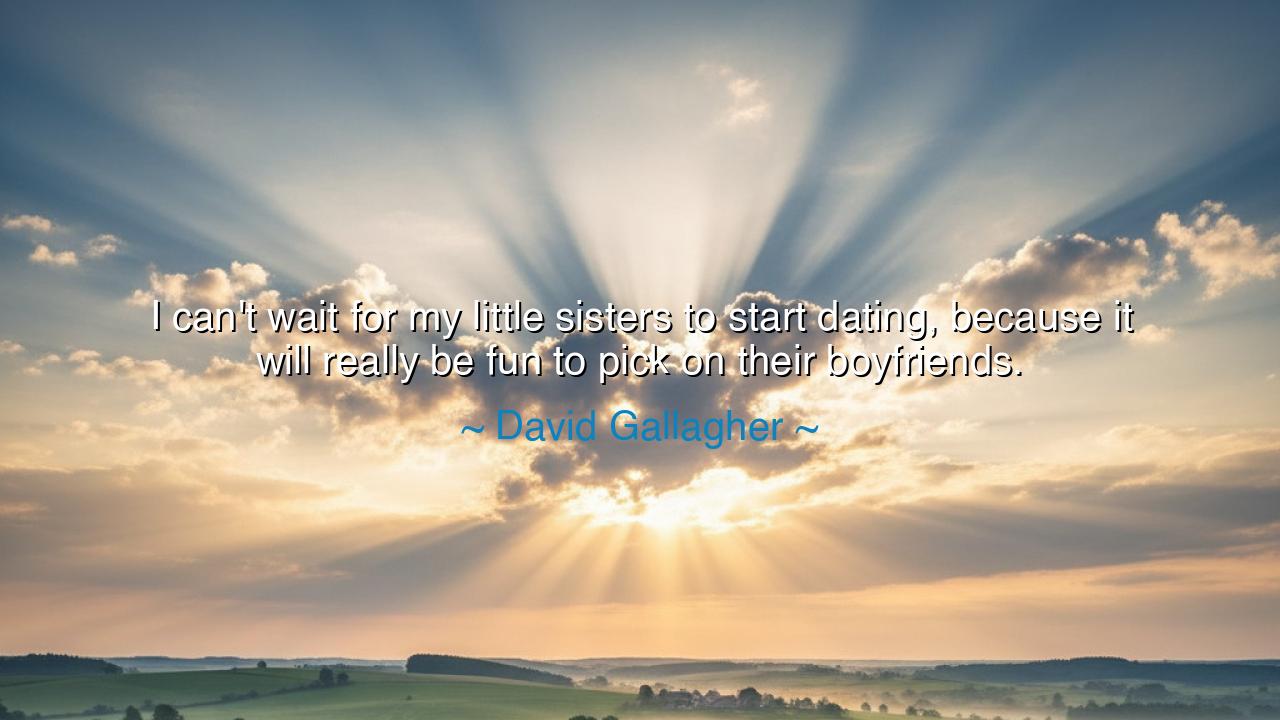
I can't wait for my little sisters to start dating, because it
I can't wait for my little sisters to start dating, because it will really be fun to pick on their boyfriends.






There are some sayings that sparkle with humor but conceal, beneath their laughter, the enduring warmth of love and protection. Such is the lighthearted yet profound sentiment expressed by David Gallagher, who once said: “I can’t wait for my little sisters to start dating, because it will really be fun to pick on their boyfriends.” To the casual ear, these words sound merely mischievous — the teasing of an older brother imagining his sisters’ suitors squirming under his watchful gaze. But to those who listen deeply, this quote reveals something timeless: the instinct to guard, to guide, and to cherish those who are dear, especially the young and the innocent. It is a jest born of love, and love, when it protects, often hides its tenderness behind a smile.
To “pick on their boyfriends” is not truly to torment, but to test — to measure the worth of those who would enter the sacred circle of the family. The older brother stands here as a symbol of watchful guardianship, not unlike the sentinels of old who stood at the gates of cities to keep out harm. His humor conceals duty. Beneath the playful tone lies the unspoken vow: “Let no one approach those I love without honor.” This is an ancient instinct, carried by brothers since time immemorial — the sense that one’s role is to defend not only through sword or word, but through discernment, ensuring that those who would claim affection come bearing respect and sincerity.
In the ancient world, such familial protectiveness was revered. Among the Greeks, the tale of Antigone and her brother Polyneices reveals the unbreakable bond of siblings — a love that defies even kings. And in more tender lore, the Norse sagas tell of brothers who rode into battle not for glory, but to avenge wrongs done to their sisters’ honor. These stories, though draped in myth, spring from a shared truth: that the love between siblings is both fierce and sacred, rooted in the soil of childhood, watered by shared laughter and struggle. Thus, Gallagher’s jest — modern in form but ancient in spirit — carries the echo of those same bonds, translated into the language of gentle teasing instead of blood and battle.
There is also a touch of wisdom in the humor, for it acknowledges the cycles of time — that the elder, who once guided and guarded, will watch as the younger steps into the world of love and choice. To “wait” for one’s sisters to begin dating is to stand at the edge of change, aware that childhood’s days of simplicity will soon give way to the complexity of adult hearts. In that moment, the brother’s teasing becomes a shield against melancholy. He makes light of what he cannot control — for though he might joke about intimidating suitors, he knows that love, once kindled, belongs not to him, but to fate. His laughter, then, is also letting go, the way one smiles when watching a fledgling bird leave the nest.
Consider, too, the tale of Queen Elizabeth I and her half-sister Mary Tudor. Their bond was marked by rivalry, yet beneath it pulsed a shared memory of blood and burden. In youth, they were sisters; in rule, they became opponents. Yet even amid political warfare, there remained a strange respect, a recognition that the ties of family endure beyond conflict. From them, we learn that sibling love is never pure gentleness — it is woven of laughter and argument, protection and provocation. Gallagher’s words reflect this paradox: to tease one’s sisters is to declare affection; to “pick on” their lovers is to proclaim loyalty. Such is the dual nature of familial love — both tender and tough, playful and profound.
And in this, there is a universal teaching: that love expresses itself in many forms. Not all affection is soft-spoken; not every guardian stands with solemn face. Sometimes, love laughs — it teases, it jests, it conceals its gravity beneath humor, lest it weigh too heavy on the heart. The brother who jokes about his sisters’ future boyfriends is, in truth, saying: “I care for them so deeply that I will not let harm come easily.” His jest is his armor; his humor, his vow.
The lesson, then, is this: protect those you love, but do so with warmth, not with control. Let your care be a shield, not a cage. In your laughter, let there be lightness; in your protection, let there be wisdom. For love that smothers destroys, but love that guides and guards gives wings. When your time comes to watch someone you love step into the uncertain world of affection and risk, do not meet it with anger or fear — meet it with grace, with humor, and with faith in their strength.
So let the words of David Gallagher be remembered not merely as jest, but as gentle philosophy. In teasing, he teaches that love is both playful and powerful. In laughter, he shows that protection can be kind. And in waiting — that sacred patience before change — he reminds us that time transforms all bonds, but never breaks the thread of affection woven in childhood. Cherish your loved ones fiercely, guard them wisely, and let your care be felt even in your laughter — for that is the way of love that endures beyond all seasons.






AAdministratorAdministrator
Welcome, honored guests. Please leave a comment, we will respond soon